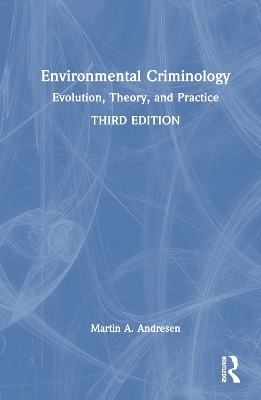
Environmental Criminology
Routledge (Verlag)
978-1-032-45636-2 (ISBN)
The field of environmental criminology is a staple theoretical framework in contemporary criminological theory. This fully revised and expanded edition of the world’s first comprehensive and sole-authored textbook on this influential school of criminological thought covers a wide range of topics, including:
the origins of environmental criminology;
the primary theoretical frameworks, such as social disorganization theory, the routine activity approach, geometry of crime, rational choice perspective, and multilevel models that integrate environmental criminology;
the practical application of environmental criminology;
an examination of how theories are operationalized and tested; and
policy implications for the practice of crime prevention.
As well as these popular topics, Martin Andresen also discusses a number of topics that are at the leading edge of research within environmental criminology. New to the third edition is an expanded coverage on multilevel models of environmental criminology, harm indices, crime mapping, hot-spot policing, and future directions in environmental criminology.
This text will be ideal for courses on crime prevention, where students are often encouraged to consider policy problems and apply theory to practice. This book offers up environmental criminology as a theoretical framework for making sense of complex neighborhood problems, so it is also perfect for courses on geography of crime, crime analysis, and, indeed, environmental criminology. It would also be a good supplement for courses on criminological theory.
Martin A. Andresen is Professor at the School of Criminology, Simon Fraser University, Canada.
Part I: Early work on the ecology of crime 1.The beginnings of the geography of crime 2.Social disorganization theory Part II:Theories within environmental criminology 3.Routine activity approach 4.Geometry of crime 5.Rational choice perspective 6.Theoretical integration in environmental criminology 7.Crime prevention: theory PART III:The practice of environmental criminology 8.Crime prevention: implementation, evaluation, and empirical evidence 9.Crime measurement 10.Spatial issues with crime analysis 11.Hot spots of crime 12.The temporal dimension of crime 13.Environmental criminology and the crime drop 14.Geographic profiling 15.(Near-) repeat victimization 16.Journey to crime 17.Crime and place
| Erscheinungsdatum | 11.11.2023 |
|---|---|
| Zusatzinfo | 9 Tables, black and white; 105 Halftones, black and white; 105 Illustrations, black and white |
| Verlagsort | London |
| Sprache | englisch |
| Maße | 156 x 234 mm |
| Gewicht | 880 g |
| Themenwelt | Naturwissenschaften ► Geowissenschaften ► Geografie / Kartografie |
| Recht / Steuern ► Strafrecht ► Kriminologie | |
| Sozialwissenschaften | |
| ISBN-10 | 1-032-45636-1 / 1032456361 |
| ISBN-13 | 978-1-032-45636-2 / 9781032456362 |
| Zustand | Neuware |
| Haben Sie eine Frage zum Produkt? |
aus dem Bereich


